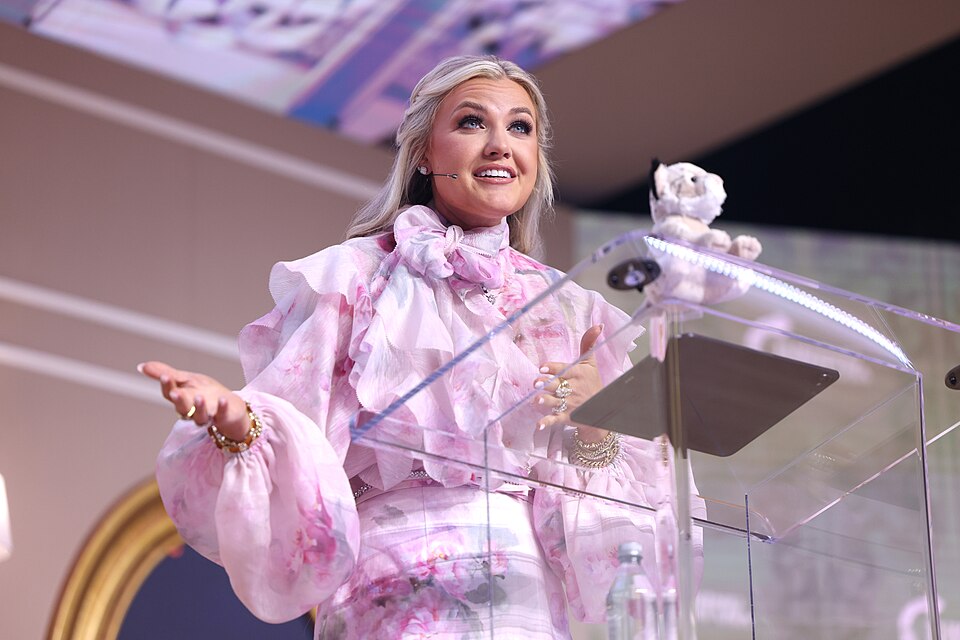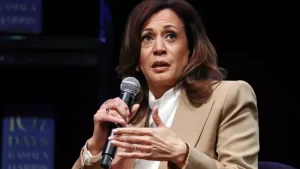The world watched in shock as news spread of Charlie Kirk’s tragic assassination, a moment that reverberated far beyond the conservative movement he helped shape. But amid the grief, confusion, and public mourning, one voice rose with a message that was both deeply personal and profoundly spiritual—his wife, Erika Kirk.
In the days following her husband’s death, Erika shared a deeply emotional and faith-rooted reflection on the moment she saw Charlie’s body, the memories he left behind, and the forgiveness she chose to give—even to the man accused of ending his life. Her words offered a rare glimpse into the raw, human side of a public tragedy, while also delivering a message of grace that stunned mourners, critics, and allies alike.
Charlie Kirk, the well-known founder of Turning Point and a strong advocate for conservative youth engagement, was remembered not just for his political influence, but for his unwavering belief in faith, family, and country. His assassination ignited widespread sorrow across the conservative movement and led to a massive outpouring of support from figures including President Donald Trump, Vice President JD Vance, and countless grassroots supporters who viewed Kirk as a central voice in American culture and politics.
At the heart of the mourning stood Erika Kirk—his partner in life and now the bearer of both his memory and his mission.
A Moment of Unthinkable Loss
Erika’s account of seeing her husband’s body quickly became one of the most discussed and emotionally potent reflections shared in the aftermath of his death. In interviews and at his memorial service, she recalled the surreal mix of love, horror, and faith that defined that moment.
She was returning from Utah when she got the news that Charlie, just 31 years old, had been fatally shot. On the flight back home to Provo, she gazed out the window at the clouds and mountains. The sky was clear, the landscape peaceful, and she said she couldn’t help but think: “This is exactly what he last saw.”
When she arrived at the hospital, officials tried to shield her from the sight of his body, gently offering her the option not to view him. But she refused.
“With all due respect, I want to see what they did to my husband,” she said.
What she found, however, was not the horror she expected, but something eerily comforting.
“His eyes were semi-open,” she said. “And he had this knowing, Mona Lisa-like half-smile. Like he’d died happy. Like Jesus rescued him.” She described how it seemed as though the bullet hit, he blinked—and then he was in heaven.
Erika kissed him goodbye. It was a moment she had missed that morning, before he walked out the door. A simple goodbye kiss that many couples take for granted—one that, in this case, she would carry with her forever.
From Heartbreak to Resolve
When she stepped onto the stage at State Farm Stadium in Scottsdale, Arizona, to deliver her memorial tribute, she was greeted by tens of thousands of mourners. The audience included some of the most influential names in American politics and culture. But Erika’s voice did not waver when she spoke. It echoed across the stadium—steady, gentle, but fortified by something deeper than mere composure.
“I felt shock. I felt horror. And a level of heartache that I didn’t even know existed,” she said. “But there was something else, too. Even in death, I could see the man that I love… I also saw on his lips the faintest smile.”
For her, that smile carried a message.
“It revealed to me a great mercy from God in this tragedy.”
She explained that Charlie felt no pain—that the fatal shot was instant. That his final moment on earth was paired with peace, not panic.
This was more than a remembrance—it was a theological reflection on suffering, death, and divine grace, shared not as mere consolation, but as a conviction.
A Hero Remembered
Charlie Kirk’s legacy was at the center of a memorial service that in many ways mirrored the cultural and political movement he helped energize. The event was part megachurch worship service, part political rally, and entirely a tribute to a man whose influence cut across generational and ideological lines on the right.
Music filled the stadium. Performances by Christian worship leaders like Chris Tomlin, Brandon Lake, and Phil Wickham created the atmosphere of a revival. Gospel anthems blended with patriotic classics, culminating in a live rendition of “God Bless the U.S.A.” performed by Lee Greenwood. As the final chords echoed, President Trump took the stage, delivering a eulogy that paid homage to a man he called “a great American hero” and a “martyr for freedom.”
Trump credited Kirk with helping mobilize young voters in the 2024 election cycle, a movement that played a pivotal role in Trump’s return to the White House. He emphasized Kirk’s role in shaping the next generation, praising his message that young Americans should marry, have children, and pass on their values.
Charlie Kirk’s impact was undeniable—seen in both the crowd that gathered to remember him and in the generational movement he had fueled.
Forgiveness in the Face of Violence
But perhaps the most unforgettable moment came not from the dignitaries or entertainers, but from Erika herself.
During her speech, she turned to the one topic that had, until then, remained largely unspoken—the man who pulled the trigger.
The accused, a 22-year-old man from Utah, had been arrested and charged with Kirk’s murder. While the legal system moved forward, Erika stood before the nation and said words that stunned even those who shared her faith.
“My husband, Charlie—he wanted to save young men, just like the one who took his life,” she said. “I forgive him.”
It was a deeply Christian statement, anchored in the doctrine of grace and redemption. But its emotional weight went beyond religious principle. It was a public act of mercy—a reflection of both her own faith and Charlie’s calling.
Erika’s decision to forgive was not a dismissal of justice. It did not erase the pain or the trauma. Instead, it offered a path toward healing, rooted in the belief that no life is beyond redemption, even one marked by violence.
Carrying the Torch Forward
Charlie Kirk was not only a public figure—he was a mission-driven activist who built Turning Point into one of the most influential conservative organizations in America. With his passing, the future of that mission was uncertain. But at the memorial, Erika announced that she would step forward to lead Turning Point, vowing to carry on her husband’s work.
Her leadership marks both a continuation and a transformation—one defined by the same values Charlie championed, but forged through the crucible of personal loss.
“Charlie’s life was not perfect,” she said, “and his work was not finished. But I will finish it.”
Her pledge received thunderous applause—an echo of both respect for her courage and anticipation for what comes next.
A Legacy Sealed with Hope
The story of Charlie and Erika Kirk—of their shared journey, sudden tragedy, and faithful response—will be told and retold for years to come. It blends politics and personal loss, public influence and private grief. Yet at its core, it is a story framed by love, faith, and a belief in something eternal.
In the quiet after the ceremony, as thousands of mourners made their way to the exits, one image remained—the faint, mysterious smile on Charlie Kirk’s lips. To Erika, it was not just a comforting detail. It was a message written on the edge of eternity, a reminder that death does not have the final word.
“That smile told me everything,” she said. “Even in the tragedy, God was merciful.”
In that moment, surrounded by grief, applause, and hope, Erika did what she has done since the moment she saw her husband’s body—she chose grace over bitterness, faith over despair, and forgiveness over revenge.
And now, she walks forward—not alone, but carrying the memory and mission of the man she loved, sealed with a smile pointing toward heaven.

Emily Johnson is a critically acclaimed essayist and novelist known for her thought-provoking works centered on feminism, women’s rights, and modern relationships. Born and raised in Portland, Oregon, Emily grew up with a deep love of books, often spending her afternoons at her local library. She went on to study literature and gender studies at UCLA, where she became deeply involved in activism and began publishing essays in campus journals. Her debut essay collection, Voices Unbound, struck a chord with readers nationwide for its fearless exploration of gender dynamics, identity, and the challenges faced by women in contemporary society. Emily later transitioned into fiction, writing novels that balance compelling storytelling with social commentary. Her protagonists are often strong, multidimensional women navigating love, ambition, and the struggles of everyday life, making her a favorite among readers who crave authentic, relatable narratives. Critics praise her ability to merge personal intimacy with universal themes. Off the page, Emily is an advocate for women in publishing, leading workshops that encourage young female writers to embrace their voices. She lives in Seattle with her partner and two rescue cats, where she continues to write, teach, and inspire a new generation of storytellers.









